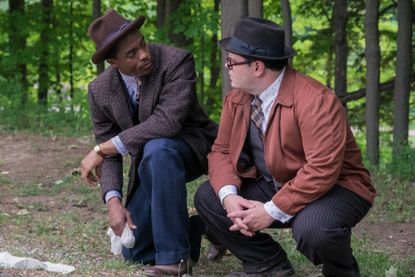Marshall is not the film you think it is
Despite all appearances to the contrary, it is not a biopic of Thurgood Marshall


The most surprising thing about Reginal Hudlin's film Marshall — which hits theaters Friday — is how emphatically it's not a biopic. You'd be forgiven for thinking it was, based on that brooding photo of Chadwick Boseman as Thurgood Marshall on the poster. He looks solemn, respectable, challenging, earnest, just as a Supreme Court justice in the making should. And the film starts off making certain promises: We first encounter Marshall in his undershirt, dressing and preparing for his day. Boseman is both vulnerable and attractive in those lovely first moments; as we watch the man don his professional armor, there's every reason to think we'll see more of this — of Thurgood Marshall, civil rights hero in the making, learning to become the force that he became.
This is not that story. Marshall is a procedural, and a good but mighty strange one. The film touches on a couple of Marshall's cases (Lyons v. Oklahoma makes an appearance) but the one it focuses on — The State of Connecticut v. Joseph Spell — isn't one people typically associate with Marshall. For good reason: His co-counsel Sam Friedman (a reluctant Jewish insurance lawyer, played by Josh Gad) argued it. The basic setup resembles the case in To Kill a Mockingbird: A wealthy white woman named Eleanor Strubing (played by Kate Hudson) accused her "Negro chauffeur-butler" of raping her several times and trying to kill her. The defendant, Joseph Spell (Sterling Brown), pleaded innocence. Cinematically speaking, this seems like a perfect opportunity to create a black Atticus Finch.
Instead, the film muzzles its main character. The judge (James Cromwell) rules that only Friedman will be allowed to question witnesses; Marshall may remain present, but he cannot speak. The result is an unusually high-stakes buddy film in which Marshall — who initially sees Friedman as a pliable puppet he can strong-arm into vicarious advocacy — comes to respect his co-counsel. And Friedman, a Jewish skeptic who meets his share of racialized violence (thanks partly to Marshall's incendiary remarks to the press), comes to appreciate Marshall's legal mind and ethical imperative.
Subscribe to The Week
Escape your echo chamber. Get the facts behind the news, plus analysis from multiple perspectives.

Sign up for The Week's Free Newsletters
From our morning news briefing to a weekly Good News Newsletter, get the best of The Week delivered directly to your inbox.
From our morning news briefing to a weekly Good News Newsletter, get the best of The Week delivered directly to your inbox.
The trouble — and I hesitate to call it trouble, because this is a very competent film — is that it shouldn't have been called Marshall, because Marshall himself has no arc. The vulnerable man we see in those opening shots evanesces. Boseman is a twinkly, irreverent delight in this film — he certainly does justice to Thurgood Marshall's sense of humor — but he's also basically a superhero. He's perfect from the moment he puts his suit on: composed, strong, convinced, and right. He already knows it all. He doesn't learn, or change, or grow.
That's kind of a shame. The State of Connecticut v. Joseph Spell took place at a time when Marshall's public identity was more linked to criminal defense than to fighting Jim Crow; it would have been interesting to engage with the growth pangs that must surely have accompanied his transition into the Civil Rights powerhouse he became. There's unfortunately no room for development in this version of Marshall; he's fully formed at 32. The effect (as Alissa Wilkinson argues here) is that structurally, Marshall isn't really the protagonist of this film. Friedman is. He's the character who learns and grows and changes — whose personal life we see more of, whose weaknesses we understand.
There are a few other perplexing choices: For one thing, the real Joseph Spell never denied having relations with Eleanor Strubing (it's pretty central that he lies about this in the movie). For another, the film shoots the various accounts of the encounter between Strubing and Spell as flashbacks. This is a truly disorienting decision: It means we see Eleanor's false accusation acted out as if it really happened, alongside every other version of the story as it unfolds. A procedural is about sifting through the evidence and finding the truth; it's a little disconcerting, therefore, for the camera to honor equally a scene that never happened alongside one that did — particularly since accounts of the attack (as they appeared in newspapers) laced the horror with a potpourri of racist tropes.
Finally, the film introduces a number of really intriguing conundrums — including the possibility that the NAACP, which was in crisis, was "using" Joseph Spell and advising him in ways that benefited the institution more than the man himself — but those questions don't really sharpen or resolve.
The film does elegantly capture the ugly cronyism in the court, the ambient intimidation leveled against those who stood up for men like Spell, and the fraught camaraderie that develops between people with a common enemy. It's gorgeously shot, and often surprisingly funny. Gad does a nice job as Friedman — he handles the comedy lightly and the character rises to unexpected seriousness. As for Boseman, he's so compelling he somehow manages to have insane chemistry with everyone in every room — even Dan Stevens, who plays the bigoted prosecutor.
The truth is, I'd love this film had it been called something else. The Thurgood Marshall presented here is an engagingly foul-mouthed superhero, and the film's ending (which I won't spoil here) forces it into stunning resonance with the present. It's a fascinating and somewhat obscure and laudatory slice of Marshall's professional life, and that's all, and that's fine. But there's room for another Marshall picture — maybe one that goes into his meeting with Malcolm X ("I think we called each other sons of bitches and that was all there was," Marshall said once), or his relationship with Lyndon B. Johnson, or his relationship with his wife Buster (which gets short shrift here), or his disagreements with Martin Luther King, Jr.
"The interesting things that can go in a book, you can't write," Marshall once said. True, but maybe you can film them.
Create an account with the same email registered to your subscription to unlock access.
Sign up for Today's Best Articles in your inbox
A free daily email with the biggest news stories of the day – and the best features from TheWeek.com
Lili Loofbourow is the culture critic at TheWeek.com. She's also a special correspondent for the Los Angeles Review of Books and an editor for Beyond Criticism, a Bloomsbury Academic series dedicated to formally experimental criticism. Her writing has appeared in a variety of venues including The Guardian, Salon, The New York Times Magazine, The New Republic, and Slate.
-
 6 scenic white water rafting destinations to get your heart racing
6 scenic white water rafting destinations to get your heart racingThe Week Recommends Have a rip-roaring time on the water
By Catherine Garcia, The Week US Published
-
 Dangerous substances in Lunchables are raising concerns over children's health
Dangerous substances in Lunchables are raising concerns over children's healthIn the Spotlight High levels of lead and sodium were recently found in the snack packages
By Justin Klawans, The Week US Published
-
 The Week contest: Fired art
The Week contest: Fired artPuzzles and Quizzes
By The Week US Published
-
 Walter Isaacson's 'Elon Musk' can 'scarcely contain its subject'
Walter Isaacson's 'Elon Musk' can 'scarcely contain its subject'The latest biography on the elusive tech mogul is causing a stir among critics
By Theara Coleman Published
-
 Welcome to the new TheWeek.com!
Welcome to the new TheWeek.com!The Explainer Please allow us to reintroduce ourselves
By Jeva Lange Published
-
 The Oscars finale was a heartless disaster
The Oscars finale was a heartless disasterThe Explainer A calculated attempt at emotional manipulation goes very wrong
By Jeva Lange Last updated
-
 Most awkward awards show ever?
Most awkward awards show ever?The Explainer The best, worst, and most shocking moments from a chaotic Golden Globes
By Brendan Morrow Published
-
 The possible silver lining to the Warner Bros. deal
The possible silver lining to the Warner Bros. dealThe Explainer Could what's terrible for theaters be good for creators?
By Jeva Lange Last updated
-
 Jeffrey Wright is the new 'narrator voice'
Jeffrey Wright is the new 'narrator voice'The Explainer Move over, Sam Elliott and Morgan Freeman
By Jeva Lange Published
-
 This week's literary events are the biggest award shows of 2020
This week's literary events are the biggest award shows of 2020feature So long, Oscar. Hello, Booker.
By Jeva Lange Published
-
 What She Dies Tomorrow can teach us about our unshakable obsession with mortality
What She Dies Tomorrow can teach us about our unshakable obsession with mortalityThe Explainer This film isn't about the pandemic. But it can help viewers confront their fears about death.
By Jeva Lange Published